Australians love to drink. Not quite as much as the Lithuanians, Czechs or Ugandans...
... but we do have a higher proportion of adults who have drunk an alcoholic beverage in the last 12 months than any country in the world bar (oddly enough) Vietnam:
... and we have one of the world's lowest proportions of current abstainers:
... and lifelong abstainers:
Yep, Australians love their booze. The problem is, alcohol doesn't love us back. It's the sixth leading contributing factor to premature death in this country:
But but but... isn't 'moderate drinking' good for health?
It's easy to understand how persistent heavy drinking, or periodic binge drinking, could damage one's health. But what about moderate drinking? Doesn't an occasional tipple, or a glass of red wine with dinner, as per the much-vaunted Mediterranean diet, reduce the risk of cardiovascular disease? And what about the famous J-shaped mortality curve - the notion that people who have 1-2 drinks per day have a lower risk of premature death than both people who drink more heavily, and people who never drink at all? You know, the J-shaped curve that looks like this:
Yeah, about that J-shaped mortality curve.
Lifelong abstainers vs sick quitters
Back in 1998 - that's 26 years ago, for the mathematically challenged - Shaper et al identified a potential source of error in the data which appeared to show that regular low-volume alcohol consumption was better for you than none at all. And that error was a real doozy: the non-drinking group comprised both people who had never consumed alcohol in their lives, AND people who used to consume alcohol, but had stopped drinking.
Shaper noted that these two groups had very different health trajectories and risk levels, since most people who formerly drank, but had become teetotallers, quit because they had developed health problems - at least some proportion of which were attributable to their prior excessive alcohol consumption. Lumping them in with people who had never had an alcoholic drink in their lives, could give the false impression that being a teetotaller is bad for your health.
Shaper's critique of the claimed alcohol-mortality J-shaped curve became known as the sick quitter effect. Sick quitters are current non-drinkers who formerly drank alcohol, but now abstain because they have developed conditions caused by, or aggravated by, alcohol consumption.
The towering stupidity of grouping lifelong abstainers and sick quitters together as the 'non-drinking' comparison group is highlighted by the contrast to smoking. If you fill in a health questionnaire, the smoking status question will ask you if you are a current smoker, an ex-smoker, or a never-smoker. It's important to differentiate between these categories because ex-smokers still have elevated risks of smoking-related diseases, even years after they've quit. But for over twenty years after the sick quitter effect was identified and named, researchers studying the link between alcohol consumption and mortality continued to perpetuate this asinine error.
In fact, an umbrella review of systematic reviews of the relationship between alcohol consumption and all-cause mortality, published just last month (March 2024), concluded that
"Over 70% of systematic reviews and meta-analyses published to March 2022 of all-cause mortality risk associated with alcohol consumption did not exclude former drinkers from the reference group [i.e. the group classified as lifetime abstainers or low-volume/occasional drinkers] and may therefore be biased by the ‘sick-quitter effect’."
More recently, evidence has emerged that lifelong non-drinkers may actually be, as a group, more prone to chronic illness that emerges relatively early in life, causing them to never take up drinking. For example, in a prospective British birth cohort study, participants who had developed a long-standing illness by the age of 23, had 4.50 times the odds of someone who did not have such a condition of reporting being a lifetime abstainer at 33 years, and 7.02 times the odds at 42 years. In other words, people who are chronically sick from early adulthood are less likely to take up drinking at any time in their lives, because they figure they're already feeling crap enough without throwing a hangover into the bargain.
So now there are two potential sources of bias when considering the moderate alcohol-lower mortality link: the sick quitter effect, and the sickly lifetime abstainer effect. Yikes!
What happens when researchers take both of these factors into account?
A systematic review and meta-analysis of 107 cohort studies that examined alcohol use and all-cause mortality, involving more than 4.8 million participants, concluded that neither occasional drinking (classified as 0-1.3 g of ethanol per day, or roughly one standard drink per week) nor low-volume drinking (1.3-24.0 g of ethanol per day, i.e. between one drink per week and a smidgen over two per day) had any protective effect on mortality risk compared to lifelong non-drinking.1
OK, if occasional and light drinkers don't enjoy any mortality benefit over lifelong teetotallers, you can't justify that twice-weekly glass of vino by claiming it's good for your health. But at what level of alcohol consumption do we go from 'this isn't helping you live any longer' to 'this is actively shortening your life expectancy'?
Well, that depends on whether you're male or female.2 Women who drank between 25 and 44 g of ethanol per day (2.5-4.4 standard drinks, in Australia) had a 21 per cent higher risk of mortality than never-drinkers. That risk rose to 34 per cent higher in the 45-64 g consumption band, and shot up to 61 per cent higher in women who drank 65 g or more of ethanol per day. As a group, female drinkers were found to have a 22 per cent higher risk of mortality than female lifetime nondrinkers. And former drinkers - some of them no doubt sick quitters - had a 27 per higher risk than lifelong teetotallers.
Men's risk of mortality didn't rise until they reached higher levels of consumption: 15 per cent higher mortality than lifetime nondrinkers at 45-64 g of ethanol per day, and 34 per cent higher at 65 g and over. Male former drinkers had a 39 per cent higher risk of mortality than male lifetime nondrinkers, suggesting that men tend to do a lot more damage to themselves before quitting booze than do women.
The final nail in the coffin of the 'light drinking is good for you' argument is this: Some of the studies included in the meta-analysis enrolled participants who were younger than 50, and followed them up for at least 10 years. In this subset of studies, occasional drinkers and medium-volume drinkers (25-44 ml ethanol per day) had a significantly increased risk of mortality compared to lifelong abstainers, while those who consumed more than 45 ml per day suffered a substantially higher risk. By contrast, studies in which participants were recruited at older ages and followed up for shorter periods did not find an elevated mortality risk with low to medium levels of consumption, and reported less risk with higher consumption.
In other words, the studies that tracked younger participants for longer periods of time found that even occasional and moderate drinking elevated the risk of dying. Older cohorts demonstrate lifetime selection bias - that is, if you're still drinking like a fish in your 60s and beyond, you're highly likely to be one of the rare genetic freaks whose bodies can withstand the daily onslaught of the world's most commonly-consumed metabolic toxin. But don't count on being part of this small club; long-lived lushes like the Queen Mother and Winston Churchill are vastly outnumbered by the prematurely dead drunks.
What lessons can we learn from the amazing disappearing J-shaped mortality curve?
The most important lesson to be learned is that people love to hear good news about their bad habits, and this applies to the research community as much as to the lay public. For almost 30 years, study after study of alcohol consumption and mortality has failed to account for the sick quitter effect, which, as I trust you'll remember, was identified in 1998. In my humble opinion, this speaks to how desperate most people (including researchers, medical journal editors and doctors) are to justify their drinking.
Many years ago, I was gifted a complete set of print back-issues of the Medical Journal of Australia. Leafing through them, I was astonished at the number of advertisements for wine and upmarket spirits. The same companies ran ads in every edition, year after year, so they obviously did pretty well out of Australian doctors. D'ya think those boozy doctors might have been keen to read some medical studies reassuring them that their drinking habits were actually good for them?
And secondly, while no pattern of drinking can really be considered safe given the wide variety of maladies linked to alcohol consumption, once women exceed 2.5 drinks per day, and men 4.5 per day, they're courting premature death. A couple who shares a bottle of red wine each night with dinner, or a tradesmen who sinks three cold ones when he gets home from work every day, will pass this mark.
Now, I understand perfectly well that alcohol consumption is woven into the warp and woof of Australian social life - and the same is true in most other cultures, with predominantly-Muslim countries being notable exceptions. Many people are concerned that they will be socially ostracised if they don't imbibe. But the rapid growth of the 'sober curious' movement is an indicator that cracks are appearing in Australia's hard-drinking culture, and initiatives like Dry July, Dry January and Sober October are amplifying those cracks and beginning the process of normalising non-drinking and occasional drinking. The alcohol industry is responding to the trend by producing more - and higher quality - low- and no-alcohol products. That's the free market for you.
Between the greater cultural acceptance and wider range of palatable alternatives to alcoholic beverages, it's now easier than ever before to be a non-drinker. But if you just can't see yourself cutting alcohol out completely, occasional drinking - as practised in many ancient societies, generally as part of a sacred ceremony or important social gathering - is unlikely to do you any lasting harm. The emphasis is on occasional: confining alcohol consumption to special occasions such as birthdays and weddings. (Beware of definition creep; a regular old Friday is not a special occasion!)
That's become my personal practice. In my late teens, I found out the hard way that neither my body nor my mind responded particularly well to alcohol, especially to the binge drinking that many of my peers engaged in. For a long while, I didn't drink at all, in large part because I was either pregnant or breastfeeding for the better part of ten years! Now, I have a celebratory drink every three or four months. I don't kid myself that it's good for me, but I'm confident that the data show I'm not doing any damage.
What about you? Have your alcohol consumption habits changed, and why?
This post has taken approximately 10 hours to research and write. If you feel you’ve obtained value from reading it, please consider a paid subscription:
For information on my private practice, please visit Empower Total Health. I am a Certified Lifestyle Medicine Practitioner, with an ND, GDCouns, BHSc(Hons) and Fellowship of the Australasian Society of Lifestyle Medicine.
For reference, a 'standard drink' is classified as 10 g of ethanol in Australia and most European countries; Hungary classifies a standard drink as 17 g of ethanol while the Japanese appear hell-bent on winning the global drinking game by quantifying one standard drink as equivalent to a staggering 19.75 g of ethanol. Kanpai!
FYI, nature doesn't care whether you identify as a man, a woman, a unicorn or a potplant. If you produce eggs, or will, or did, or would have but for developmental or genetic anomalies, you are female. (Thanks to the inimitable Heather Heying for this watertight definition.) And if you are female, you metabolise alcohol more slowly than males, reach a higher blood alcohol concentration after drinking the same amount of alcohol as a male, are more likely to suffer blackouts and hangovers, and are at risk of developing alcohol-related problems sooner and at lower drinking amounts than males.





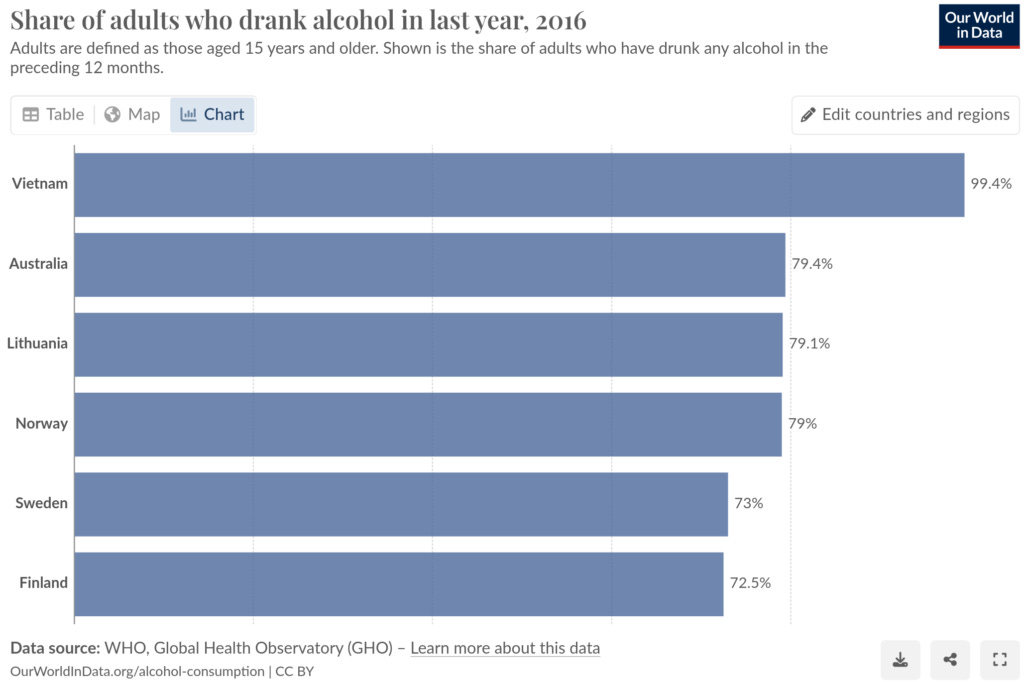
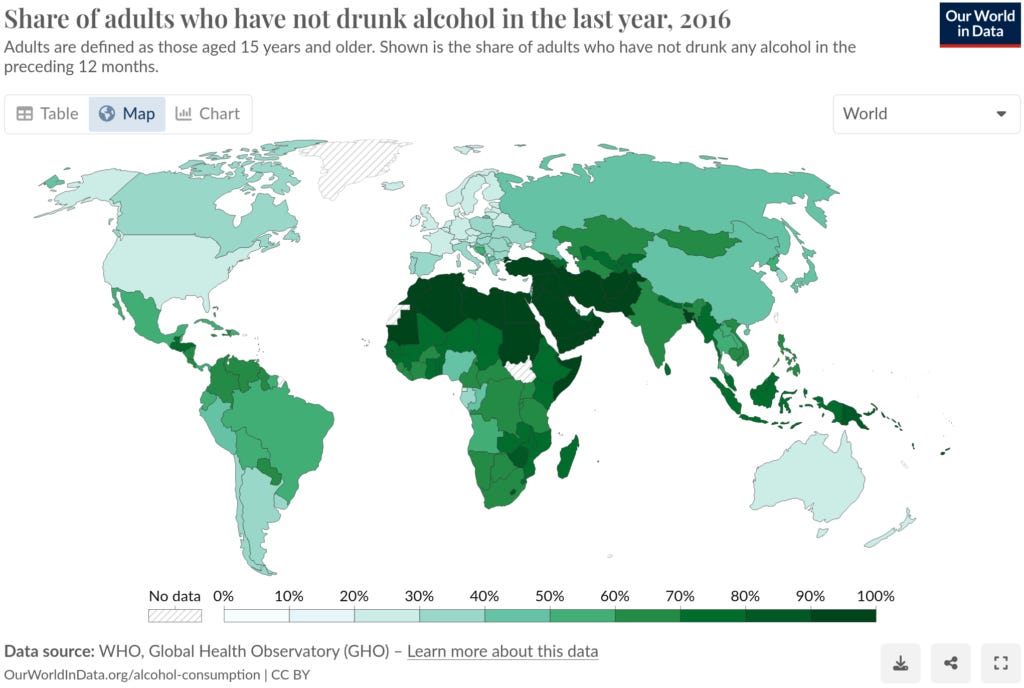
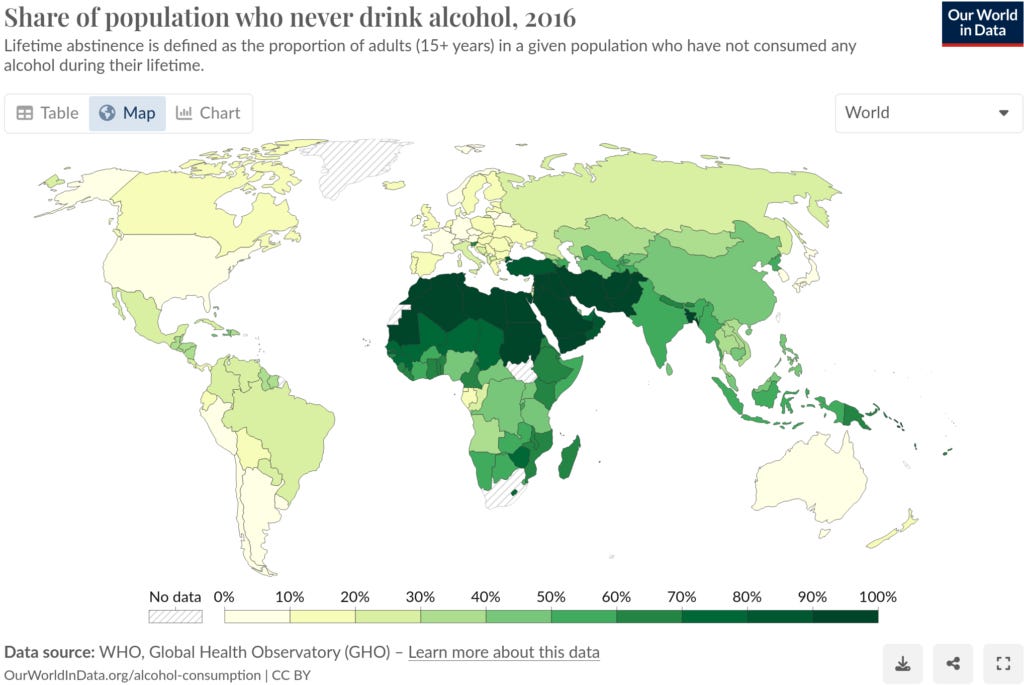
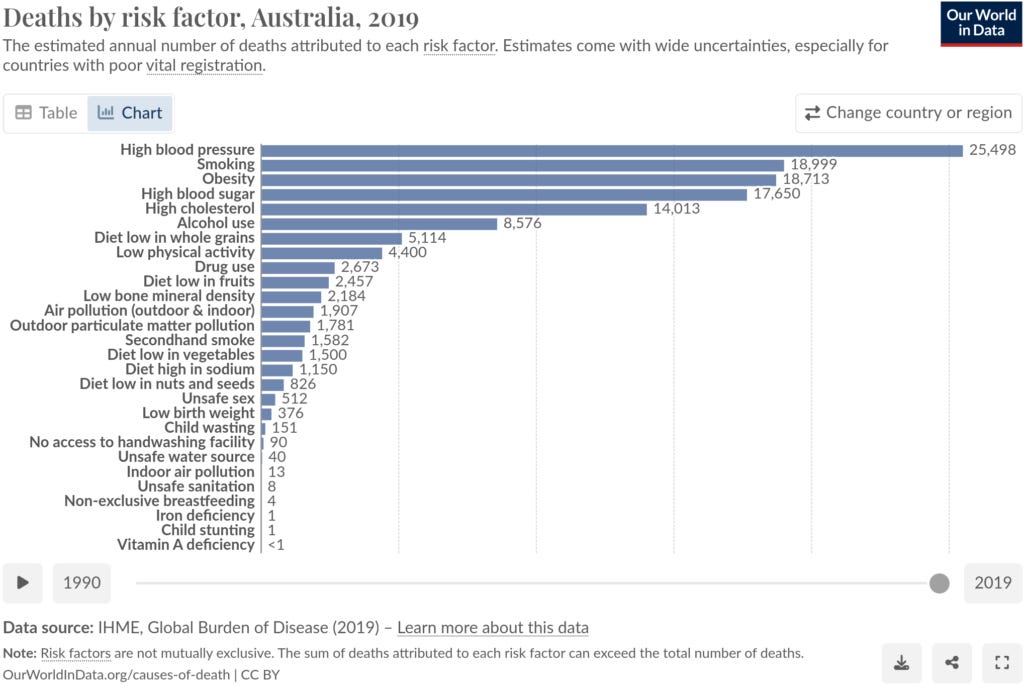
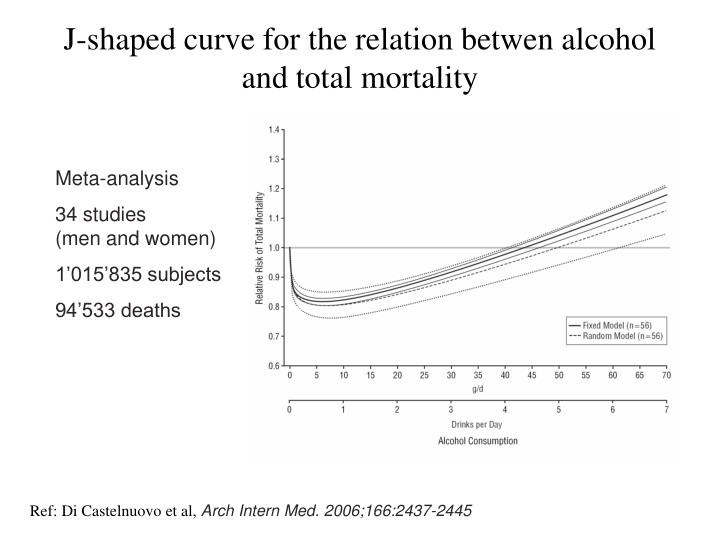
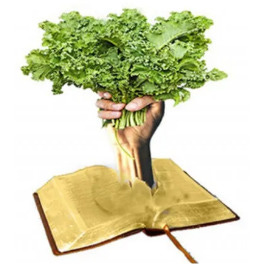
Your article is most timely thank you. I did drink a lot in my early years and later made home brew so it was a bottle a night. A cancer diagnosis at the age of 55 sobered me up at the advice of my Dr. We beat it without the assistance of MSM. My oncologist said it had spontaneously regressed. Any ways trying now to limit my intake. My father liked a beer a day and passed away at 97. Only on one med to manage a troubling prostate issue. Still walking to shops from home a month before he passed away
G'day Robyn, it takes me about five minutes to walk to the local pub and 25 mins to walk back from it, the difference is staggering.🍻